Thursday Feb 19, 2026
Thursday Feb 19, 2026
Tuesday, 12 March 2019 00:55 - - {{hitsCtrl.values.hits}}
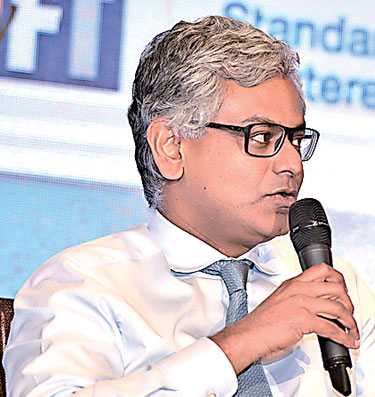 |
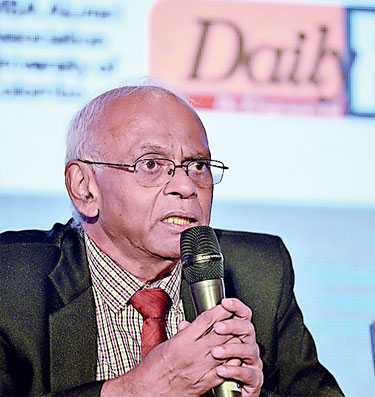 |
John Keells Holdings Chairman Krishan Balendra |
Former Central Bank Deputy Governor W.A. Wijewardene |
By Charumini de Silva
The 9th consecutive annual post Budget Forum 2019 organised by Daily FT and the Colombo University MBA Alumni Association brought together a host of business leaders and professionals to dissect Budget 2019 and share key insights on its impact on the economy and different sectors of the economy. It was the first public post-Budget forum and saw Finance Minister Mangala Samaraweera deliver the keynote address.
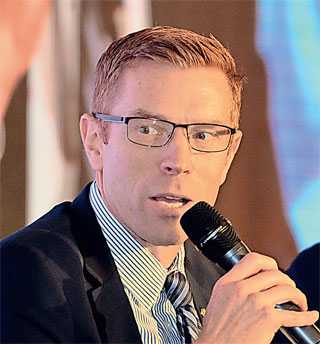 |
Chevron Lubricants Lanka PLC Managing Director and CEO Patrick McCloud |
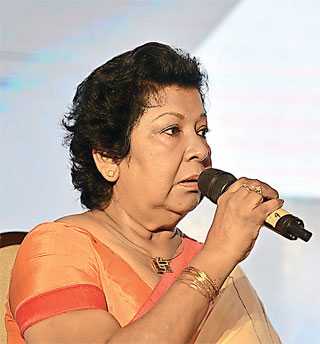 |
National Chamber of Exporters President Ramya Weerakoon |
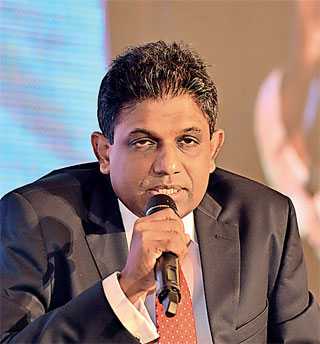 |
Standard Chartered Sri Lanka CEO Bingumal Thewarathanthri |
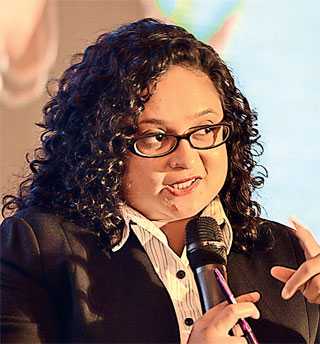 |
Technical partner PwC’sTax Advisory Director Charmaine Tillekeratne |
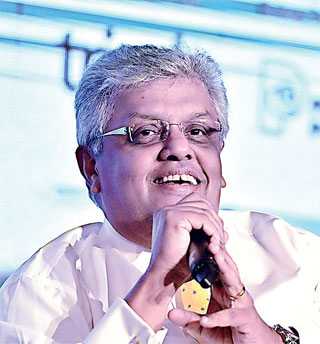 |
Finance Ministry Senior Advisor Mano Tittawella |
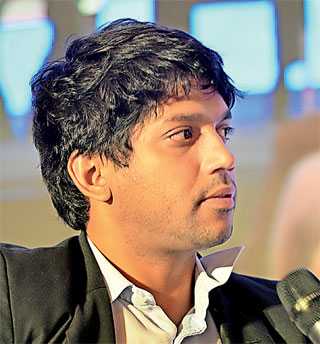 |
Ministry of Finance Economic Advisor Deshal De Mel |
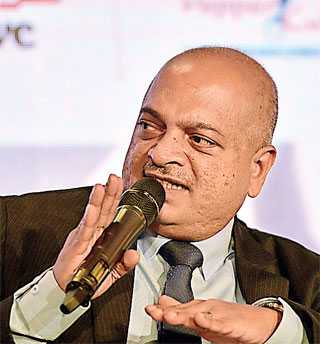 |
Daily FT Editor Nisthar Cassim. |
The Forum featured John Keells Holdings Chairman Krishan Balendra, former Central Bank Deputy Governor W.A. Wijewardena, Chevron Lubricants Lanka PLC Managing Director and CEO Patrick McCloud, National Chamber of Exporters President Ramya Weerakoon, Standard Chartered Bank CEO Bingumal Thewarathanthri and Technical partner PwC’sTax Advisory Director Charmaine Tillekeratne. Finance Ministry Senior Advisor Mano Tittawela and Economic Advisor Deshal de Mel also figured on the panel which was moderated by Daily FT Editor Nisthar Cassim.
The most sought-after post-Budget forum was backed by Standard Chartered Bank as Strategic Partner. Technical Partner was PricewaterhouseCoopers, Market Research Partner PepperCube Consultants Ltd., Creative Partner Triad, Print Partner Print Point and Hospitality Partner was Cinnamon Lakeside.
Here are excerpts of comments made at the forum.
Q: What are your initial observations of Budget 2019?
Krishan: One of the big positives is that Budget 2019 is broadly consistent with the policies that were laid down in the past two years. Thereby, we have not seen any arbitrary or ad-hoc changes as seen in past budgets. Measures taken to broaden the tax base and tax net are commendable, as we haven›t lost focus despite the temptation during an election year.
In terms of physical investments and large investments, one of the concerns we have with capital allowances and so on is that there is no guarantee of continuity, which we need to have it in reference – hope that it will be in BOI reference to give some kind of assurance on the continuity of those taxes.
The other big positive is on the construction industry and construction costs, which affects all of us in terms of housing, hotels and apartments. Commitment to bringing down construction cost by reducing cesses is a major positive. We get duty concessions to BOI agreements over the years and there will be many other taxes that have been reduced, but on large projects like Cinnamon Life it is very substantial.
Wijewardena: Being an election year, there was a wide speculation for an election budget and even in the post-Budget survey conducted by the University of Colombo, 37% has viewed it as an election Budget. However, from an economic point of view it is not an election Budget, because in an election what you find a bag of relief or ‘sahanamalla’ containing sprats, onions, dhal and all kinds of goods which ordinary people consume and we might take pride in presenting that kind of sahanamalla to the people. Fortunately, the Finance Ministry has now broken away from that and diverted the entire Budget from consumption to investment. One of the key factors that I see is that more funds have been allocated for the development of physical infrastructure and human capital, and it has also gone along with the fiscal consolidation program which he introduced in 2017.
Therefore, it has laid the foundation for any finance minister in the future to take the country forward. Unfortunately for him, the downside of the Budget is that he has challenges in implementing and his team Mano and Deshal have to do a round-the-clock job to implement these Budget proposals. In my view, it is a good development-oriented Budget that has also given space for innovation, invention and development of human capital in the country.
Ramya: From a National Chamber of Exporters perspective, Budget 2019 has taken up quite a few proposals addressing exporters, especially in the rubber and cinnamon industries. I feel this is more of an export-oriented Budget and has given more focus to support trading and development of the exporters.
Being in the apparel industry, the major challenge we have is retaining the workforce and the proposal to empower women and granting maternity leave is highly commendable. It is good for the worker and employer as they can continue the same work. Budget 2019 has reduced certain taxes like Economic Service Charge (ESC) which has a very large revenue impact for exporters.
Patrick: This Budget has a very positive impact on the multinationals in Sri Lanka because it indicates the spring of demand. Demand is good in our industry and hopefully this Budget will continue with the positive signs with clear support for entrepreneurship and education. The proposal to include IT in the education curriculum is a very positive sign. Recognition of technology start-ups with 10-15 people and providing tax benefits on payroll are quite positive.
From a Chevron perspective, empowering women was a powerful proposal because as a company, we value diversity tremendously and allowing flexible work hours. From a nurturing the poor perspective, investing in underdeveloped areas like the north and east and in the fisheries sector is commendable. Foreign construction companies to tie up with local companies is also a very positive sign.
On the flipside, the concerns I have are on the implementation timing and increasing revenue schemes. The increased taxes on motor vehicles will inherently have an effect on demand, thereby reducing the revenue associated with it.
Bingumal: Going into the fifth year of the IMF program, we are on a very narrow path as an economy and in that context, the Government has presented a very reasonable Budget looking at both short- and long-term goals. We can clearly see there are plans around improving the balance of payment and foreign reserves.
They are very important because as a country we are running on three months based on our reserves, which is at $ 6 billion now. In ASEAN markets, they have got nine to 10 months imports while we are running with three and these are some of the larger challenges we have to address.
On FDIs, we are seeing some larger perspectives. FDI is a very large part of the sustainable development of the country. With the economy running on a yearly budget and thinking YoY basis, how we are making the numbers and FDIs will drive a long way. We have done pretty well in 2017 and 2018; hope we can continue that momentum.
On the fiscal side, 15% increase in revenues is an optimistic target. The good news is that most of it is coming from alcohol and tobacco so there won›t be a lot of stress on daily expenses. Tax income, again a 13% increase is very optimistic. While we can be happy with improving from 11% to 13%, we also need to compare it with emerging markets of our size, which are hovering at around 16% to 18% GDP to tax income ratio across the markets – we need to catch up on those areas.
There is a lot of stress on bankers to lend money at 6% which is now at 11% and somebody has to pay that bill. Many think banks as an industry are making a lot of money, but banks are going through a bit of turmoil right now. In the papers very soon you will see that our return on investments (ROIs) is coming down, which is not very healthy for the economy.
All proposals to look after the SME sector that is greatly contributing to the economy are a very positive sign. Someone can argue that this is an election Budget, but there are a lot of proposals to counter that with sustainable development of the economy.
Q: There are lots of positives you mentioned, but what do you think is the game changer in the Budget?
Krishan: The effort to encourage female participation in the labour force is a big positive. If you can amend some of the laws to allow that, we can see the results in a big way, particularly in the hospitality industry.
Q: The Government has now stipulated that foreign firms should partner with local firms. As a big developer, how do you see this proposal?
Krishan: It is good to encourage the local construction industry, but from a business point of view getting the lowest cost is what matters – we have to get that right.
Mano: Some of these foreign-funded projects, technically the Government projects, were not given to private companies. We found that this move resulted in very little retention to the local economy in various ways.
When we spoke to the local construction industry, they felt that since some of these foreign-funded projects, in the Government particularly, had various concessions in terms of their costs, they were in an advantageous position when they bid for other contracts because they had the necessary equipment and so on which could be used for the other contracts.
I take Krishan›s point, which is ultimately the cost. We wanted to create a level playing field particularly for contractors who come for Government project contracts. However, the private sector has to decide on the best cost for their shareholders. They can’t entertain high costs. But for Government projects, we felt that it was a requirement for participation as well as for technology transfer.
Q: Industry says Government contracts are fine, but the problem is that they are really poor paymasters. What do you say?
Mano: Generally in Government, there is no paymaster at all sometimes. It is one of those vicious cycles, because when people come into Government contracts they factor that into account and as a result they sort of factor it into their margins, otherwise why would they bid for Government contracts? But it has a spiralling effect on cost, because ultimately we pay.
These are mostly not grants, but loans, thus from our point of view we can assure that the public gets a fair deal and you don›t have a loan because we are funding with the costs being high. It is one of those vicious cycles we need to remix.
Q: What is your take on proposals that had most impact?
Wijewardena: We are trying to convert Sri Lanka from a simple technology-based economy to a high-tech-based economy by promoting investments and innovations across the board. The foundation has been laid and the universities in Sri Lanka are being promoted as high-tech promoting institutions and have been given additional funds.
In the case of educational reforms, one of the key reforms suggested is the segregations of students into different schemes along with the introduction of STEM 10+A scheme, where you add arts and science together so that science students will learn arts and arts students can learn science.
As a result of this measure, we may build a flexible workforce in the future that has ability to think. I hope that any future government in Sri Lanka will follow this and enable the creation of a flexible workforce rather than just developing segregated sectors.
Q: In the context of the SAITM fiasco, does that mean it is a dead-end for private universities? Has the Government addressed that challenge or are reforms just taking time?
Wijewardena: Only 30,000 students get the opportunity to study in Government universities due to lack of space and the balance 70,000 will have to move either out of Sri Lanka or shift into some other kind of professional examinations.
To fill this gap, there is now a large number of private universities that have come up and the Government needs to validate the accreditation of these private institutions. The proposal to provide interest-free loans where students need to pay back to the Government in a 10-year time period is a good suggestion and as a result many of the students in Sri Lanka who are unable to get admission to a State university can fulfil their aspirations.
Even in my study years in the late 1960s, we studied on a loan which was given by People›s Bank and after joining the Central Bank I started to completely repay the loan. So it was more a private sector investment than a Government investment.
Q: In terms of providing foreign university scholarships, is there a current arrangement with Harvard? Is this just a fancy idea or it is a real case for Sri Lanka to engage in a direct scholarship program?
Deshal: There is a very strong case for it, but of course there are a lot of criteria we have to meet. We have just started the discussions with the universities. Even those universities typically fund quite a few scholarships for students in developing countries and we could also leverage on those.
But the Government actually wants to set aside the funding and give a chance to students who need it. We have to support the additional arrangements. It will be up to individual merit, but the Government will anyway support it via a MoU.
Q: What is your opinion on the game-changing factor of this Budget?
Ramya: As I said before, this Budget has given a lot of opportunity for exporters with R&D and empowering women. Women participation in most of the industries is about 75%, but with this proposal it can be increased further and enable them to work longer despite getting married or having to raise kids.
Q: There was an issue in the apparel industry in relation to decent accommodation for zone staff and transportation. Are those two not addressed?
Ramya: In the apparel industry we provide both these facilities, but unions are saying it is not true. We are taking it up with JAAF.
Mano: We have introduced a special loan scheme which addresses this whole issue where transportation for manufacturing units is given at a very concessionary rate where people can replenish their transportation vehicles with new ones.
In fact, there is a major garment manufacturer which has already come to us and almost 200 of their transportation vehicles will be replaced with modern, good vehicles through this loan scheme.
Q: You mentioned public sector reforms, but struggling to sell three hotels for the past few years. What’s the latest update?
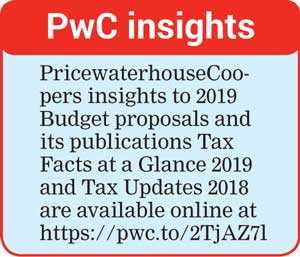 Mano: Hopefully we will get rid of the Hilton and the Hyatt this year. A lot of the work has been done. There are about 30 EOIs we have received so far.
Mano: Hopefully we will get rid of the Hilton and the Hyatt this year. A lot of the work has been done. There are about 30 EOIs we have received so far.
Q: We have started to bring in online reservations also to the tax net. What is your reaction?
Krishan: It is a good initiative, but taxing the informal sector is not going to result in a level playing field where the formal sector is priced at a different level. It is only fair that they are also coming to the tax net. The more important thing is, they should be regulated to some extent because you have not set service quality standards and there are a lot of issues and accidents. So regulation is more important than bringing them to a level playing field.
Q: Could you shed some light on NBT on credit card transactions overseas which also include foreign exam fees?
Deshal: It is a revenue measure, where the stamp duty of 2.5% has been increased to 3.5% now. It was also to address some of the digital services. At the moment, Netflix, Uber and purchases from any type of e-commerce transactions overseas are completely untapped. This is only targeted at external transactions, there is no impact at all on local e-commerce companies. It gives some degree of space for the local firms to play with foreign players.
Q: Is there no innovation rather than taxing tobacco and liquor as usual? Also the industry has been warning that the more you tax, there is less revenue and a shift to illicit. Isn’t that a reality check for the Treasury?
Mano: There have been ad hoc changes over the years and companies have not been able to plan for the future. From this year onwards, we will introduce what is called ‹indexation› giving a three-year period for the industry so that they have some certainty and their prices will be increased over a particular band.
It is important to keep a difference between soft and hard alcohol. Because the difference was slightly higher, we felt that there is a migration not only for soft alcohol but also for illegal. We have tried to address this, but not particularly in the first year.
It is true that beyond a point, it has effects on other things. It is a balancing act. The industry also requires some certainty for their investments and we have begun to address it. We have not included it in this Budget, but we will talk to the industry and tell them on how we are planning to go about in future.
Q: The National Economic Council (NEC) created by the President’s requirement and his party is not part of the Government; there is a feeling that the NEC is not really affective. What is the reality?
Mano: Looking from a political view, it’s a bit of a disjoint. In reality, it is not as bad as it sounds. Now at official level, there is quite a bit of integration.
Q: Any proposal you all were looking forward to that was not included in the Budget?
Bingumal: Budget 2019 referred to concessions around trade treaties with India and China. These two markets are big for SCB. For the first time in history 50% of the world’s middle-class will be coming from Asia predominantly driven by India and China and 60% of global trade will come from Asian countries excluding Japan.
We shouldn’t underestimate the power of these two growth engines – India and China. I don’t see enough effective discussion and initiatives on expanding trade ties with India and China due to political sensitive. As a country, we have to figure out where we fit in this important trade corridor between India and China.
Patrick: We welcome increased support for exports. What we didn’t see is acknowledgement of companies which have domestic markets here but also do exports. The ESC reduction is good to see. However, the Finance Ministry must also consider companies which are not 100% exporters but export a part of their local production. There must be some relief on taxes paid by such companies.
Krishan: Streamlining the number of taxes is one aspect and there was no reference to divesting non-core State assets. We hope these will be addressed soon.
Wijewardena: It is a matter of the NCE under the President to come up with a program that is aligned with a long-term vision. Once the proposal comes, the Finance Ministry has to align it to the Budget and targets. Right now it has aligned itself to economic strategy and we have to wait for the National Economic Plan by the NCE to accomplish goals for Sri Lanka by 2030.
Ramya: Overall there are 31 taxes related to all industries and I would suggest it be simplified to a few so in the corporate world we can reduce the number of people working on these tax areas. The Tax Department also needs to be made online, to reduce the unnecessary work.

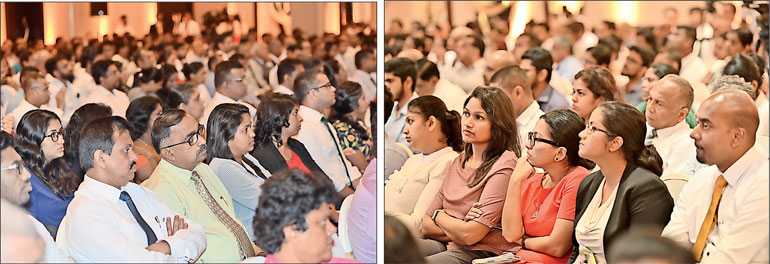

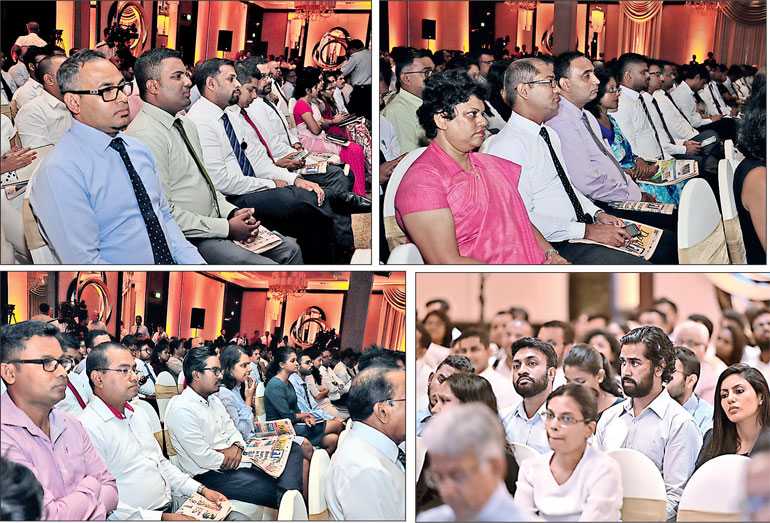


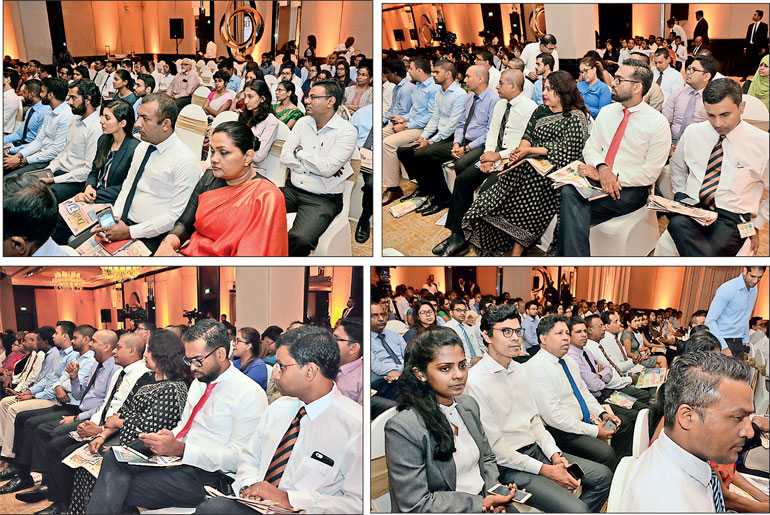


Mangala assures to speedy implementation of 2019 Budget proposals
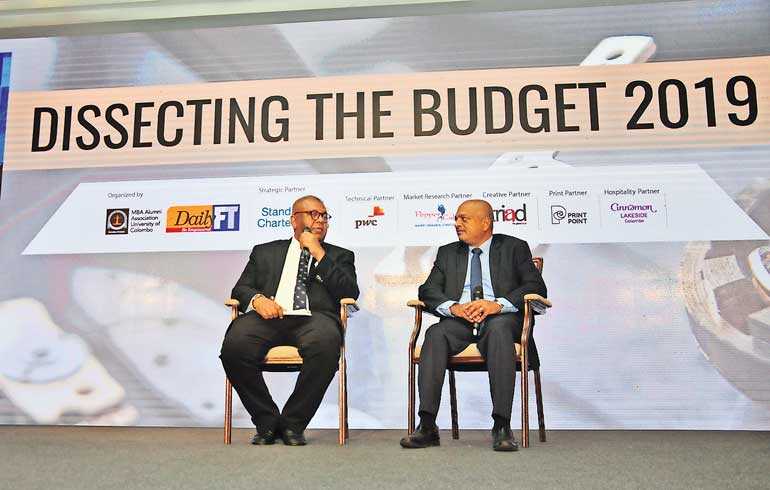
Finance Minister Mangala Samaraweera at the Daily FT-Colombo University MBA Alumni Association forum assured speedy implementation of 2019 Budget proposals.
He said that the Government has the political muscle and commitment to ensure such a realisation.
Samaraweera described the 2019 Budget as a "caring and values-driven" whilst championing free markets and private sector enterprises especially the small and medium entrepreneurs.
As the Cabinet is made up of one party, he expressed optimism of stronger implementation, and credited Budget 2019 with possessing policy consistency that would assist the Government to foster growth, focus on reforms.
Minister Samaraweera acknowledged that execution has been a long running issue. However, he pointed out that after the constitutional crisis the United National Party (UNP) together with their coalition partners had formed a Government, which eased the challenge of having to deal with contradictory policies.
“The implementation of many of our Budget proposals had been a perennial problem. When I took over as the Finance Minister, I did a little survey on what percentage of Budget proposals have been implemented in each year, and I must say that the percentage was very low. As a result, we decided to set up several Committees last year to oversee and monitor the implementation carefully. But it has resulted in some improvements, but not a satisfactory improvement. That is the challenge we have continued facing,” he said, responding to questions from the packed audience.
“Because it is an election year, I am determined from tomorrow itself to start driving these proposals, and see how we can implement it in the shortest time possible. Despite being an election year, we are quite confident that we will be back again to continue with the work,” he added. Minister Samaraweera quipped that even though a “Unity Government” was formed in 2015,its “unity was doubtful” and conceded that different polices had to be accounted for. But this constraint had now lifted and the Government had the opportunity to push ahead with its tasks.
“In my last year’s Budget, I promised to liberalise the shipping sector, and I think it is a must if we are moving beyond being a mere transshipment port for India. Because of these policy differences we had, we were unable to do the reforms, although it actually involves a little change in the regulations. I hope now that the UNP or UNF is in office, we hope to initiate these major reforms in the next two months.”
Budget 2019 was balanced, because it contains both fiscal consolidation and reform proposals, as well as measures targeted at elections, the Minister stated. He described it as a Budget that champions free trade, free enterprise and global markets. He pointed out that the Budget, Gamperaliya, and Enterprise Sri Lanka, as well as recent Central Bank policy decisions, were concentrated on funnelling more liquidity into markets to address slow growth.
“The Government has already taken action to address cash flow in the economy, as the Treasury has released Rs. 60 billion to settle outstanding payments to contractors, while the Central Bank has relaxed the Statutory Reserve Requirements (SRR) on two occasions, releasing a further Rs. 150 billion. Therefore, a total of over Rs. 270 billion has recently been injected into the system.”
Public revenue targets would also be spruced up and pursued, Samaraweera said, with a new Commissioner General for the Inland Revenue Department to be appointed after the next six months, while a new Commissioner General will be appointed by April for the Excise Department. Efforts would also focus on passing a new Customs Act.
“We have also identified a number of structural constraints, which the Budget addresses upfront, that include significant investments to upgrade skills to align human resource capabilities to match workforce demands. In this context, the Government is supporting approaches such as apprenticeship and internship programs managed by the private sector. Particularly in sectors such as health and IT, private sector-driven skills development programs will be supported in the form of stipends.”
“The Budget is about transforming our nation from a feudal myopic mindset, to a modern, dynamic and prosperous society, based on the universal values of democracy, inclusivity and reconciliation,” he added.
Following are excerpts of the Q&A with the Finance Minister and questions posed by participants following his speech at the Daily FT-Colombo Uni. MBAAA forum.
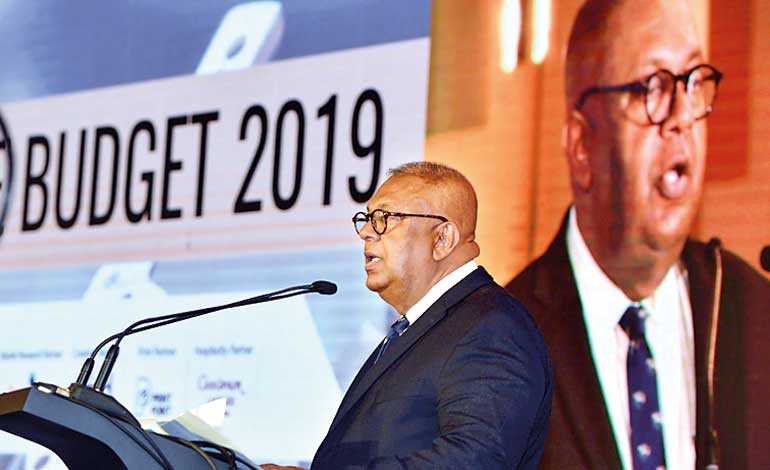
Q: Are you confident of the delivery of these Budget proposals?
Mangala: The implementation of many of our budget proposals has been a perennial problem. When I took over as the Finance Minister I did a small survey on what percentage of budget proposals have been implemented each year and I must say that the percentage was very low. As a result, we decided to set up several committees last year to monitor implementation carefully. Although it has resulted in some improvements, it is not a satisfactory improvement and that is the challenge we have continued facing. As it is an election year, I am determined from tomorrow itself to start driving these proposals and see how we can implement them in the shortest time possible. Despite being an election year we are quite confident that we will be back again to continue with the work.
Q: Have you all reviewed the progress of the Enterprise Sri Lanka program and what is the impact it has had so far?
Mangala: We have been reviewing it from the time we implemented it. I admit that there are shortcomings, but we are committed to improve it. At the beginning, we found that loans were given to some of the existing customers because of the low interest rate and it was not really helping new entrepreneurs. We have now insisted at least 60% of the loans provided must be given for new customers. There were also many complaints that the loans were being misused to promote certain favourites of different banks and to mitigate such anomalies we have started a special call centre now. There are lots of problems, but it has been implemented only for six months and we are determined to overcome those hitches.
In fact I have recently appointed a CEO who would be only overlooking this project, whose job is to provide me a weekly report. This is a good program, but we need to take it further for it to succeed. We will be also inviting some chamber members and private sector individuals to be part of the implementation committee.
Q: Although the Inland Revenue Department (IRD) is one of the key Government revenue collecting institutions, it has been operating without a proper Commissioner General for many months and this can be a jeopardy. When will you appoint a new Commissioner General?
Mangala: We appointed a new Commissioner General for the IRD just before the 51-day crisis through Cabinet, but that was cancelled by the Government. We are now keeping the earlier Commissioner General as the Acting Commissioner General for the next six months till we find a right person. It is important that we find the right person for the job, especially in these three revenue collection institutions; IRD, Customs Department and Excise Department.
Out of the three institutions IRD this year has begun to do well. In January and February there was an increased revenue of about Rs.5 billion in each months and the trend continues. We expect that there will be an additional Rs.60 billion from the IRD this year. Sri Lanka Customs has a full-time person. However, the high leakages and archaic Customs Act, which was drafted in the time of Queen Victoria, are not letting the institution achieve its full potential. Taking this into consideration we are now in the process of re-drafting a new Act. In fact Deshal and his committee are working on a new Customs Act and Excise Act which I hope will also help to increase revenue. As per the Commissioner General at the Excise Department, the last person is retiring and we are in the process of appointing a new Commissioner General by April.
Q: What is Government doing about the 43 finance companies that are burdening the entire economy?
Mangala: These 43 finance companies were something that was brought to my attention especially in the north and east as well as in drought stricken areas. There were thousands of women who usually become victims; I don't want to even call them microfinance companies because they are simply ‘loan sharks’. Money is lent to these women and they end up paying interest as high as 200%. Last year there had been about seven women who died by suicide since they couldn't repay their loans or they had been subject to violence. This is why we dealt with some of these companies and decided to waive off loans of 45,000 women in 13 districts in the north and east.
Q: You kept saying that this year’s Budget is a UNF Budget, why is that?
Mangala: As you all know we were in a coalition within what was called a ‘National Unity Government,’ well unity was doubtful, but in many ways we were bound by certain constrains. In my last year’s Budget, I promised to liberalise the shipping sector and I think it is a must if we are moving beyond mere a transhipment port for India. Due to these policy differences we had within the Government, we were unable to do the reforms although it actually involves little changes in the regulations. I hope now that the UNP or UNF is in office, we hope to initiate these major reforms in the next two months.
Audience Q&A

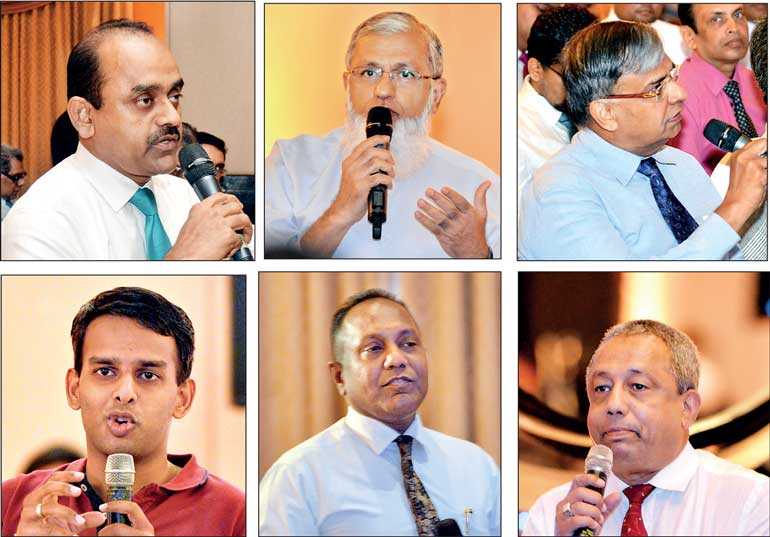
Q: In terms of Government workers’ salary increase, public sector efficiency is only 30% but each year the Government increases it, where taxpayers also have to bear a major part of that cost. The concern is, out of this total Rs. 12,500 given over the years, 90% of this is utilised for consumption, which is not a good thing.
At least if you all can think about how people can invest it in capital, savings or investment assets, it would be ideal. As we don’t produce locally we always consume imported products, as a result it will add up on the BOP. Secondly, we need to understand how we are going to create awareness and educate them.
Nisthar Q: In 2015, we had this huge stimulus and I think we are now paying for it. That Finance Minister is here. Isn’t the increase of salary also sending a message across to remain in the public sector and join it too?
Mano: According to the 2015 salary increase, a similar practice goes up to 2020 which is almost doubling of the salaries. There was a big issue on the anomalies of public sector salaries. The Government decided that without addressing each issue separately, which causes further anomalies, particularly since these demands for wage increases is higher when we go into an election cycle.
The President appointed a Salaries Commission, which was specifically asked to look at the anomalies. They looked at the anomalies and the report is out now. The Cabinet afterwards looked at how we can implement it without blowing the Budget and that work has started now.
The Rs. 12,500 this year is an allowance and it will be controlled once the report comes in. All the points you made are true and it is a huge cost. Going forward, we have to address the productivity issue of public sector workers.
There is lack of productivity in some areas and on the other hand the Government sector as a whole is poorly paid. The trick is in the long term, to look at productivity and pay based on performance.
Along with this issue, pension has become problem. In Sri Lanka, around 90% take home salary is pension while in other countries it is below 60% and has contributory pensions. We are nowhere near that. Pension is another big issue that we will have to deal with in the near future. In this Budget, there›s a small line which says pension policy and a scheme to be worked out.
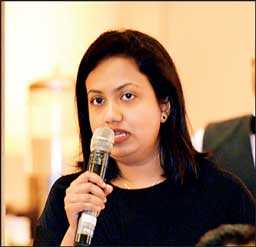
Q: There are a large number of Government institutions looking into the income of the Government, but we don›t see that the Budget has addressed how these sick companies will be recovered. Where are the long-term strategies like 2030? How do those plans connect to this Budget?
Deshal: On how this Budget fits into the 2030 long-term plan, most of the issues we have addressed are related to structural issues in areas like labour, education, access to affordable finance, and women participation. It has addressed some of the short-term and long-term issues, paving the way for Sri Lanka to be on a much more stable position in the long term.
Q: Normally insurance policies are not paid out because of the small print that’s at the bottom of the page. So now, where is Enterprise Sri Lanka? And where can we find it? You talk about these loans, but when we go to get them you can’t find it.
Mano: You basically need to have a viable proposal – that’s the small print. Having a viable proposal is where some of the problems will occur. It doesn’t necessarily mean it’s a viable, commercial proposal, but we also have to protect the banks because ultimately they are custodians of the public money.
So if you have a viable proposal which can be turned into a commercial idea, then you have a chance. But remember that our banks are also to a certain extent risk averse, security-based banking sector and that’s where the Government is coming in.
We will guarantee that loan to the bank providing there is a viable proposal as we can’t expect the banks to take that up, which will be bad on their balance sheets. In implementing Enterprise Sri Lanka, we are having some difficulties because additionally the bankers, especially when giving SME loans, are averse to security-less lending.
Q: The laws are very rigid to start a firm, especially the Labour Act where hire and fire is not even heard of in Sri Lanka. While we protect the employee, we have to protect the employer. We have not seen any protection for the employer in that case and have to be saddled with unproductive workforce.
Mano: In Sri Lanka there are a few holy cows, one is the Labour Law. Any attempt to reform the Labour Law comes with some serious comebacks; politically, unions and public. For example, we had some concerted efforts on working hours for women, which we have reiterated in this year’s Budget as well; we had many discussions; but it comes to a full stop at some stage.
It would be very pragmatic, which is one area we may have to carry on for the first year of a new Government. This is not going to happen any time soon and that›s the reality.
When it comes to hire and fire, we are at the holiest part of the cow. In the short term we need to work around it. I think there are some reforms that any Government should do in the first year of its office, because then the benefits will start improving in the third and fourth year, it can›t be done in the last year.
SOE reforms is another holy cow. A lot of work has been done and we need to start implementing them. There is a public enterprise reform program that the World Bank is helping us with, where very good ideas have come through; but the progress is slow. We also need to get the eligibility approved by Cabinet for a Samurdhi to build a database to see who actually deserves it. If we can target the deserving people, then we can move the cash transfers directly and it will cost much less.
Q: As a source country, what sort of assistance is there from the State to the gem and jewellery industry?
Deshal: There were some of the interventions with the upfront costs on PAL and some other import duties. The fundamental issue the industry faces is with regard to income taxation because of the difficulty in identifying the input cost, which has been an ongoing debate. We haven’t been able to come to an agreement with the fiscal policy team and the industry in terms of solving that. We will talk more once the Inland Revenue Act matures a bit more.
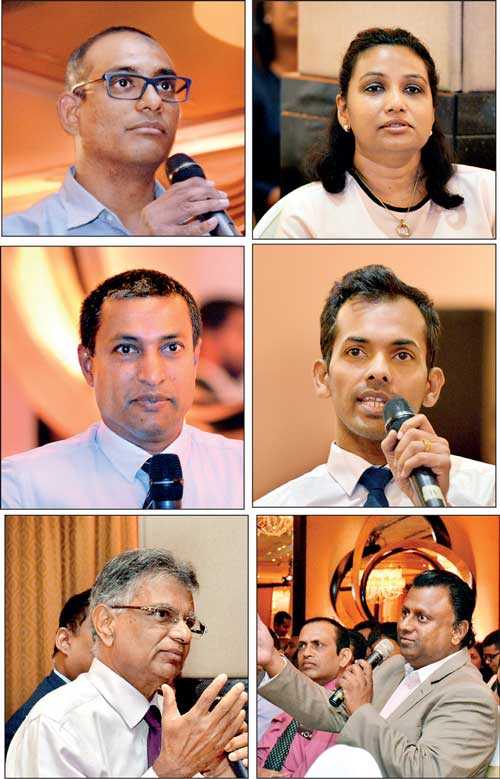
Q: Foreigners investing $ 400,000 or more in condominiums will be entitled to residential visa. Can the Government consider a staggered investment basis and even going up to $ 1 million?
Mano: In concept it is possible, but this is the start to see how we implement it. There is something I like to clarify. The wording here ‘deed of agreement’ could have been better worded, but what it means is that if you have a sales and purchase agreement signed before 31 March, not a deed of transfer, it will be exempted from VAT.
Q: I have seen a lot of hotels being built here, but where are your tourism incentives in the Budget?
Deshal: Tourism has a fairly generous tax scheme at 14% and Property Income Tax is below the normal threshold, but even then there are some specific issues that the industry faces. Some of the upfront taxes have been reduced, NBT on tourist hotels was reduced as well. Cesses on import duties on refreshment materials will be reduced towards the middle of this year.
Audi Q: There is an ESC on the point of import of any article or goods, so will it be going to be credit at the point of sale or will be a cost?
Deshal: You can sell it off against Income Tax, like Special Commodity Levy.
Q: Financing the Budget, views on possible inflation? About a third of the new funding proposals are given tax concessions, your views on sustenance on that through direct tax?
Wijewardena: The numbers given in the Budget are very clear. Overall budget deficit is going to be maintained at 4.4% in 2019 despite the fact that we are having a very difficult time period. Since Sri Lanka has accumulated public debt from the time we became independent from the British, it is now time for us to gradually reduce it.
For that purpose, the only available solution is to cut down the budget deficit. In 2018, they wanted to bring it below 3.5% but unfortunately given the financial circumstances of the country in the first four-month period, the Government has not been able to bring it down to 3.5%.
The long-term vision of the Government should be to bring it down to a tolerable level of about 2% of the GDP and eventually use it to balance the budget so like in Thailand, we will be able to cut the public debt to the country.
Mano: Over the last two years or more, the Central Bank has kept a close tab on inflation. When we borrow domestically, there are inflation pressures, but we will look at it carefully and balance. We don’t want inflation to shoot up.
The other issue is ultimately we have to increase national incomes. You can›t be satisfied with 3.5% to 4% growth, but we have to increase it in a sustainable way by increasing exports and FDIs. Main focus of this Budget is to give incentives to our export industries to drive foreign earnings and attract FDIs.
One of the misconceptions we have is that FDIs are correlated to tax incentives – there are some aspects but we have to also improve our Ease of Doing Business situation. The difficulties these foreign investors go through with complex processes are much more frustrating than the incentives they get for FDIs. While we do everything else, the only way to mitigate downsides is to increase export income – that›s the way we are going to drive the economy in a non-inflationary way.
Deshal: Although there are some adjustments to alcohol, cigarette and vehicle taxations, the bulk of the revenue increase is expected from previously introduced measures and amendments. The Monetary Law Act which is almost ready is an important legislation under which the Central Bank can fund Government deficit with discipline. The act will be a game changer in bringing in financial discipline and inflation shooting up.
Q: Is a branch of a foreign bank borrowing from the parent entity subject to Withholding Tax?
Charmaine: Under the definition of the Inland Revenue Act, when a branch borrows from head office, there should be no Withholding Tax because it’s a financial institution. But if you are asking in context of the newly-implemented exemption where a loan is given by a non-resident, it actually is a policy decision. We have to wait and see what the wording is but the direction seems to be that if it is from a related party, that exemption won’t apply. But under the new Inland Revenue Act the branch and its head office are separate entities but again they are related, so it will be a policy decision.
Q: One big drive of tourism is the F&B offering of the destination. This has come up again and how are we going to make it more inviting?
Deshal: In the 2017 Budget, there were quite a few reductions in cesses after the requests by the tourism industry and that would have had some impact on those beverages. But this year there were no specific additions to that.
Q: Is there a cap on the number of internships the Government will sponsor in the IT industry and when will this program start?
Deshal: We are looking at 1,000 for a year. In terms of timing, we are collaborating with SLASSCOM in developing this so we have to discuss as soon as they are ready to kick-off. The funding has been allocated and as soon as the Budget is passed we can roll it out.
Q: Since lately, we have seen the beedi market expanding rapidly mainly because of the price disparity. The industry is regulated and the cess was increased recently. Given that there is a lot of revenue opportunity in the industry, are there plans to make it a level playing field industry?
Mano: It was another contagious proposal which gets amended at committee stage. Your point is well taken; not only it will increase the revenues, but also disrupt the playing field. First attempt has been made; hopefully we will carry on with it.
Pix by Upul Abayasekara and Sameera Wijesinghe